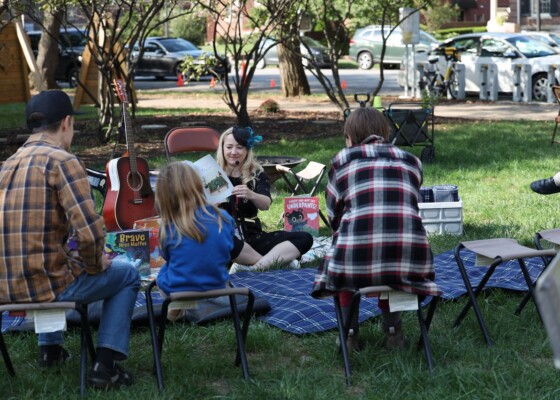PK Idea: Learning Garden
November 18, 2010This post was written by Callie Smith from the Christian Theological Seminary. Callie presented this idea as part of Pecha Kucha Volume 11: FOOD on Nov. 12. A Spirit &…
This post was written by Callie Smith from the Christian Theological Seminary. Callie presented this idea as part of Pecha Kucha Volume 11: FOOD on Nov. 12. A Spirit & Place event, this event featured 8 ideas competing for a $5,000 implementation prize, courtesy of CICF and Indiana Humanities Council.
I’ve been really interested lately in where we go these days to get together with people. I’m no gardener—I’ll say that up front! But, community gardens are these kind-of-public spaces where people get together and focus, together, on something important. Sixty-some community gardens already in Indy show that local food is important to us. We even have “peace gardens” in the city that pay attention to growing relationships among the gardeners. It’s an interesting idea.
Bosnia—of all places—is a great example of gardening that impacts human relationships in profound ways. A group in Sarajevo has worked on a new model of community gardening called “peace and reconciliation gardens” where Croats, Serbs and Muslims—people with some very different politics and religions—leave their guns outside the garden gates so that inside the gardens they can focus on things that they all need: work for themselves and food for their families. It’s an excellent idea!
I’ve been excited to be in conversation with the International Interfaith Initiative and other partnering organizations that want to take what Indianapolis has done with sustainable growth and peace gardens to the next level: local people growing local food while growing space for people of different faiths and cultures to get together. This is important because we live in a world where different beliefs are an excuse for a whole lot of conflict. Our culture’s typical answer to that is to ignore differences, but that’s not always helpful in the long run. So places where people with different beliefs get together to cooperate and learn about each other are places that sustain more than land. They can sustain a whole community.
This project—the Butler-Tarkington Learning Garden—is an idea from the International Interfaith Initiative, which is working with other organizations to bring the Learning Garden to a high-visibility area of the Butler-Tarkington neighborhood. The idea is: this will model a kind of meeting place that needs to be seen because it affects more than just the gardeners who work there. Native Hoosiers will be gardening there. A local community of Iraqi refugees, Christian as well as Muslim, will be gardening there. Muslims, Christians, Jews, adults and youth from the area will be gardening there. This garden project will bring people with different backgrounds together to practice working together not by ignoring their different beliefs and traditions but by actively learning about those differences.
In addition to increasing the availability of fresh, locally-grown produce to families in the area, including Iraqi refugee families, the Learning Garden will benefit Indianapolis beyond the Butler-Tarkington neighborhood by demonstrating a model of community gardening that creates space for crossing boundaries that too often divide our communities. It’s an approach to community gardening and community building that can impact gardeners today and grow leaders for tomorrow.


